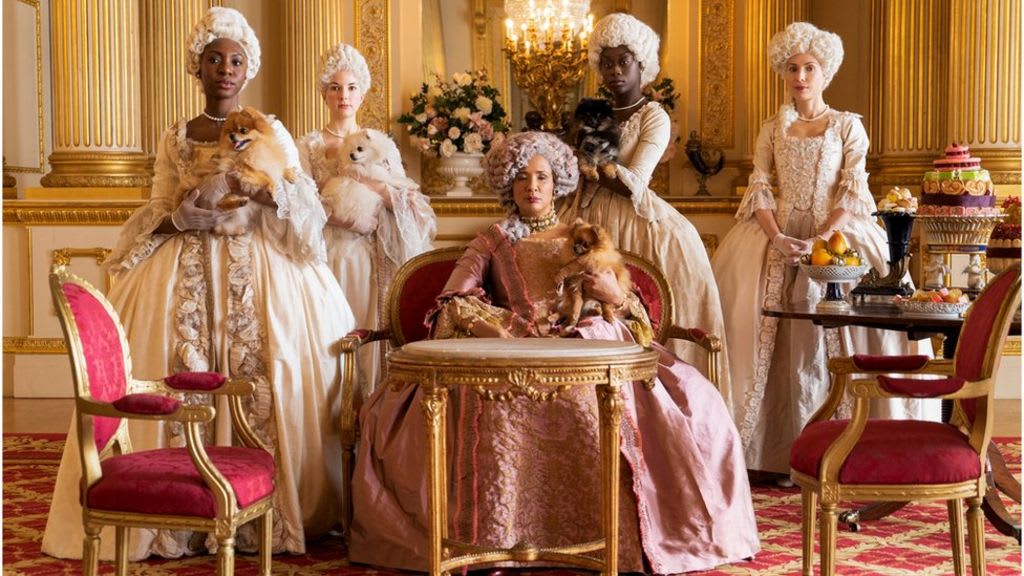
I grinned, guffawed and cringed over 10 times each in the first episode of Bridgerton. I was at war with myself.
The first side of myself, who I usually show to the world, is the teacher. I am an English and Social Studies teacher with an English degree. I am a writer. And, since the age of 12, my favourite books were written in the 1800's. This side of myself did not like Bridgerton. The contemporary music (I'm sorry Billie, but Beethoven was the "it" artist in this time) and disregard for many of the social norms (husbands were not in the room when wives gave birth until the 1980's...) to make the show palatable for more people made me cringe. But, I kept watching...
I kept watching because the other side of myself, the young woman who loves a good romance and loves history (not surprising how that part doesn't change) was grateful that it had been created.
The teacher who is constantly trying to get anyone to dive into history: rejoiced.
For years, I have been playing the role of educator. History has always been something I have loved down to my very core. My mantra for teaching history has been: "turn names into people." People, after all, are very important. People do not seem distant or out of touch; their wants, hopes and desires have not changed. However, art has.
A small known fact about Regency Era writers (1795-1837) and Victorian writers (1837-1901) is that many of the greats released their novels in segments in newspapers. So, they were paid by the word. Families would gather round and, usually the father, would read the segments out loud. Much like "old" tv, you had to wait for the next segment to come out the following week. This built suspense and intrigue. But also, encouraged writers of that time to publish very LONG books. From this period, we gained Bram Stoker's Dracula and Charlotte Bronte's (published under the pseudonym Currer Bell) Jane Eyre. My literary heart shines for these novels, but as an emerging writer also accepts that the first 100 pages would probably be cut out of most of them if they were being published today. And, lets be honest, even school curriculum is moving away from them.
This brings me to Pride & Prejudice: the most common regency era novel published in 1813. As a literary lover, many were shocked when I hated Pride & Prejudice. How does the 12 year old who read all of the Brontes hate Jane Austin? Well, it was too wordy and ONLY about love. But, not about a love that I could relate to: in any stage of my life! The repression and brutally long paragraphs of fluff to fulfill the decorum requirements made me roll my eyes and toss the paperback to the floor... again... There was no real scandal (in my modern standard), no real push against norms, and (it had to be said) no monsters. The novel didn't say much to me. And the idea of another novel ending in marriage, directly pushed against my common sense (and the voice of my mother saying "I don't care what you do as long as you stand on your own two feet"). As a modern reader, Pride & Prejudice didn't hold my attention or reflect my values.
But, I gave Bridgerton, a show set in the same time period, a chance. I knew friends of mine would ask me about it; and let's be honest, I have watched most history shows on Netflix.
I inhaled Bridgerton in about 2 weeks. Curled up in my comfies with a bowl of popcorn and leftover Christmas chocolate; I devoured Bridgerton. And while I saw the glaring differences that obliterated historical accuracy; they were completed in a way that impressed me. They challenged historical norms so that the modern viewer would engage with and relate to the time. They made people from these times real, just like I try to do every day in my history classes.
The musical voice of Julie Andrews immediately pulls you into Bridgerton. But then: women of multiple sizes, people of multiple ethnic groups, gay characters and a black Queen had me cheering at my tv. Moreover, the relationships were relatable. Bridgerton took you past Elizabeth Bennett and Mr. Darcy driving away in a carriage for their honeymoon. Modern viewers don't stop at the wedding; we push further. Modern viewers don't want "just" wifely goals, we want writers, dress makers, duchesses and wonderful wives/ mothers.
The representation in Bridgerton is amazing; finally! Modern viewers will not watch whitewashed racism or discrimination. Watching older films from this time are full of cruel injustices that are glaring and brutal to watch. While the teacher in me would use older films as case studies to show the injustices of the past and challenge them, new films tend to take a stand (which is the right thing to do). Therefore, older films that do not take a stand, are not appropriate or acceptable to a modern audience.
This brings me to the beauty of historical fantasy versus historical fiction. Historical fantasy does not have real people or events from the past. Without that restriction, Bridgerton could not be compared to the real past. Bridgerton creates a very similar world that people can use as a gateway to connecting with history. I love that all people can look at Bridgerton and hopefully see themselves represented in one or more of the characters. Dreams of children who wish to be actors and creators, can see themselves in the most successful Netflix show of all time. And, since Mayfair is not a real place and (sadly) Simon Bassett is not based on anyone specific in history, the history teacher in me does not have an accurate historical account to second guess it.
Would I use it as a course material in my classroom? Never. But, if someone is interested in history, Bridgerton is a way to dive into history in an easy way. Swim around, see if you like it. Then, I can challenge you to jump in deeper and experience more history.
Looking for more content that fills your heart and your head? I recommend using this formula:
1. Modern release date (2010 and up)
2. Look for feminist/ activist actors (Maggie Smith in Downton Abbey, Helena Bonham Carter in The Crown, Oprah in almost anything)
3. Read reviews, specifically reviews that talk about representation.
4. If you ever feel lost; just watch Outlander (which is just as scandalous as Bridgerton! but Scottish)
Welcome, watcher of Bridgerton, I can't wait to see the love of history shine in your eyes.






Comments
There are no comments for this story
Be the first to respond and start the conversation.